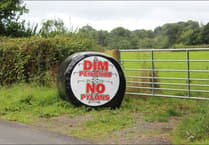Feisty Barbados. Fourteen miles by seven. Family connections to this proud Caribbean republic means our little bar in The Vaults celebrated the recent 56th anniversary of Bajan independence. Tiny Barbados, self-sufficient on incomes from tourism, sugar, and sugar derivatives (including rum). Not a tenth the population of Wales, yet long liberated from British meddling. Got us talking. Got me thinking.
For “the current manner in which Wales is governed is not sustainable”, according to a new report from the Independent Commission on the Constitutional Future of Wales. The report claims to have identified three viable options for the future of Wales, including Wales becoming a sovereign nation, like Barbados.
2008, arriving in mid Wales, entrenched in a small-c conservative British mindset, I opposed Welsh independence. Not worth the risk. While finding the progressive Welsh Labour way of governing attractive, such as free prescriptions and more generous student loan system, I believed we gained more together, economically and in political stability. But things aren’t what they used to be. My dreamy landscape is now upended.
There can be no doubt the case for an independent Wales has been royally bolstered by Brexit, by disastrous decision-making at Westminster, and to a lesser extent Buckingham Palace missteps. Increasing numbers of Welsh voters conclude Great Britain is not so great for Wales and view independence as the most effective vehicle for resolving Welsh problems. This shift in attitude is reflected in polls suggesting just half the Welsh electorate remain opposed to independence (remainers?), an on-the-increase third of voters ready for independence, and the rest stuck on the constitutional fence. A narrowing trend that indicates any future independence referendum might prove a tight contest. So, with this growing appetite for Welsh independence, where is the electoral pathway to our referendum?
A vote for Plaid Cymru would seem the obvious route. For Plaid’s leader, Adam Price, contends Welsh independence “would permanently remove Westminster’s right to run roughshod over our democracy”, and suggests that if Welsh Labour do not back an independence referendum, Plaid could instead hold a “consultative referendum on Wales’s constitutional future”.
That’s the spirit! But for me, the self-proclaimed ‘Party of Wales’ is losing its ideological way, squandering political goodwill, dogged with scandal, in-fighting, and self-interest. Over recent years, Plaid has become increasingly unpalatable to vote for - disagreeable and unrepresentative - more like the regressive boys’ clubs they oppose in both the Senedd and Westminster.
The remaining parliamentary parties are beholden to domineering English in-laws. So, in the last Senedd elections, while three Welsh Labour candidates openly supported independence, their leader, Mark Drakeford, in line with Westminster colleagues, implied a referendum should only be held once a pro-independence party wins a majority in the Senedd. So, no time soon, and with little support from Welsh Labour.
No support from the pessimistic Welsh Liberal Democrats either, who assert an independence referendum would create “chaos and division”. Lazily rolling out the unimaginative chestnut, “independence would hurt the poorest in Welsh society the hardest” - when of course, it need not.
Obviously not Welsh Conservatives who, according to their spokesperson, regard any discussion of independence as “a waste of time and resources”. And there we run out of options. However, while on the topic of Welsh Conservatives, let me take time to tackle Patrick Loxdale, Ceredigion Conservative Association’s Chairman, and his recent political pontifications (‘Why do the left seem so fearful of success?’ - Cambrian News, 30 November). Wild claims that include: the political left seem most prone to be “blinded by their own prejudice”; that “socialism is all about pulling the ladder up behind you”; and bizarrely, that those employed by public services would “do very well to remember” their wages are funded by the “hard work and entrepreneurship that the Left [sic] hate so much”.
As a hardworking left-wing entrepreneur, I am irked by Mr Loxdale’s faintly comical (if not so tragic) assertion that the party of questionable VIP lanes, of non-existent Brexit dividends, of ludicrous Trussonomics, holds the key to growing the economy, supporting entrepreneurs, and adequately funding public services. How short does Mr Loxdale think our memories are? Mr Loxdale’s presumptions that the political right is the preserve of growth and aspiration; that our public finances, our public services are safer in Conservative hands, are absurd. Look around, Patrick.
Mr Loxdale appears steadfastly oblivious to the reality that the NHS has been chronically underfunded since the austerity-driven Tories took office in 2010. A succession of right-wing policies resulting in critical levels of understaffing while permitting NHS billions to be funnelled into the private sector via agency staff, PPE VIP lanes, and other contract services. So, I particularly object to Mr Loxdale’s disingenuous deployment of misleading maths suggesting the NHS is only sustainable if borne by an average income tax take of £5,761 per taxpayer. “If that’s not true, then the system will inevitably go bust,” he incorrectly deduces. For Mr Loxdale’s fiscally illiterate calculation ignores the UK’s £74 billion corporation tax contribution. Ignores the £509 billion expected from VAT and other receipts.
Mr Loxdale suggests “people who really value the NHS and other public services [...] will respect the hard-working businessmen and women for the benefits they bring to society and the wealth they create and quietly celebrate the tax revenues which they generate for all of our benefit”. Mr Loxdale is new to business, he says. He will learn, I hope. For it is Mr Loxdale who will do very well to remember that without public workers providing and maintaining the infrastructure and public services required to operate a business, the private sector would barely function. Ceredigion Conservative Association’s chairman appears blind to significant economic benefits an adequately funded NHS, emergency services, and other vital public works provide for the private sector and its workforce. The left-wing quid pro quo that allows all sections of a progressive capitalist society to prosper.
Therefore, I take issue with Mr Loxdale’s insinuation that those “lucky enough to earn ten times the national average” are right to begrudge higher levels of tax. Loxdale would have us believe that extraordinary hard work equates to such huge incomes. But under-pressure nurses would not be striking if this were true. The truth is, for many, maybe most, it is not hard work but designation that defines income, such as those roles historically dominated by women still defined as less valuable. So, we won’t reduce vacancies in essential services by banning strikes or by shovelling more public money into private pockets, but by restoring public-sector wages to previous standards at least; free-market economics at play; rewarding hard work, if you prefer; levelling up, if you like.
To improve NHS pay offers, Scotland is increasing its uppermost two bands of income tax - a pragmatic policy that would get my vote here in Wales. Because, left wing is to remember that if we are fortunate enough to achieve financial success, however hard we work, we neither succeed entirely by ourselves, nor entirely for ourselves. I fear Mr Loxdale forgets who paid for his medical qualifications, and thus his generous male-dominated-sector surgeon’s salary.
Anyway, as for Welsh independence, there appears no short game to a referendum, no realistic electoral options until disillusioned characters within Plaid, Labour, and the Lib Dems embrace the longer game, structure a fresh and progressive political path - an untainted, left-wing, Welsh alternative. Might get my vote.
Email: [email protected]





Comments
This article has no comments yet. Be the first to leave a comment.